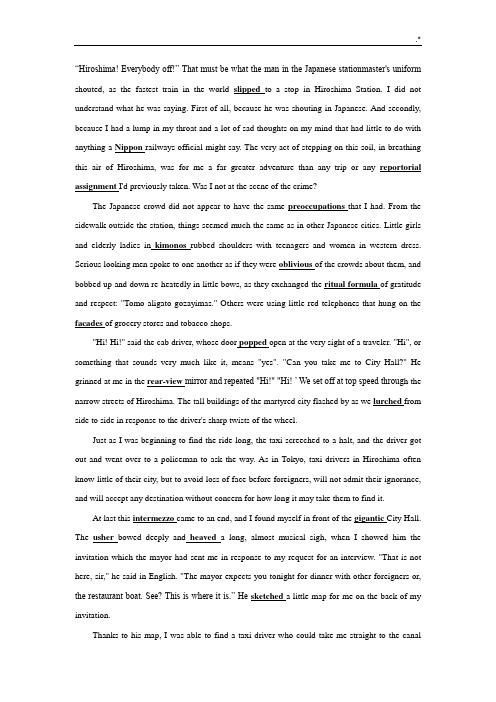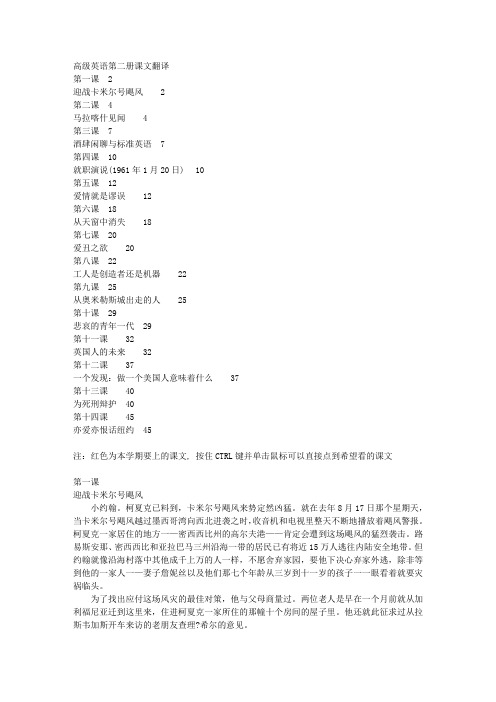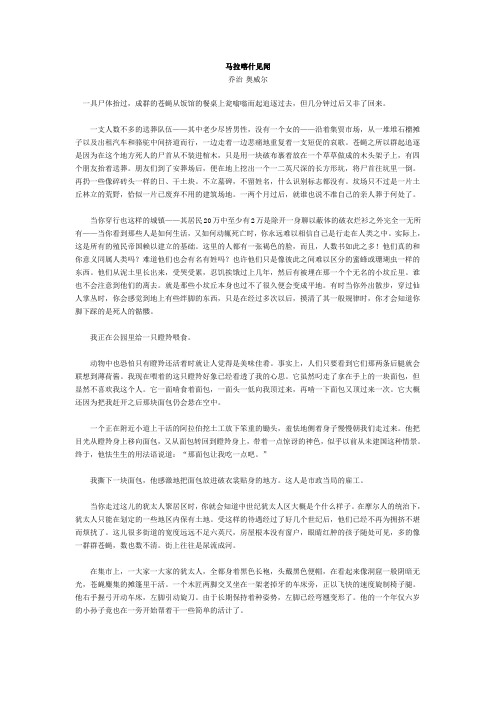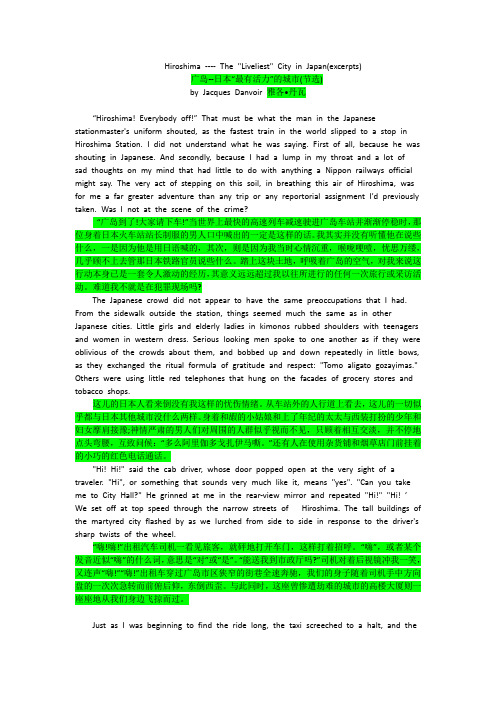高级英语lesson2原文及翻译
高级英语lesson2原文及其翻译

“Hiroshima! Everybody off!” That must be what the man in the Japanese stationmaster's uniform shouted, as the fastest train in the world slipped to a stop in Hiroshima Station. I did not understand what he was saying. First of all, because he was shouting in Japanese. And secondly, because I had a lump in my throat and a lot of sad thoughts on my mind that had little to do with anything a Nippon railways official might say. The very act of stepping on this soil, in breathing this air of Hiroshima, was for me a far greater adventure than any trip or any reportorial assignment I'd previously taken. Was I not at the scene of the crime?The Japanese crowd did not appear to have the same preoccupations that I had. From the sidewalk outside the station, things seemed much the same as in other Japanese cities. Little girls and elderly ladies in kimonos rubbed shoulders with teenagers and women in western dress. Serious looking men spoke to one another as if they were oblivious of the crowds about them, and bobbed up and down re-heatedly in little bows, as they exchanged the ritual formula of gratitude and respect: "Tomo aligato gozayimas." Others were using little red telephones that hung on the facades of grocery stores and tobacco shops."Hi! Hi!" said the cab driver, whose door popped open at the very sight of a traveler. "Hi", or something that sounds very much like it, means "yes". "Can you take me to City Hall?" He grinned at me in the rear-view mirror and repeated "Hi!" "Hi! ’ We set off at top speed throug h the narrow streets of Hiroshima. The tall buildings of the martyred city flashed by as we lurched from side to side in response to the driver's sharp twists of the wheel.Just as I was beginning to find the ride long, the taxi screeched to a halt, and the driver got out and went over to a policeman to ask the way. As in Tokyo, taxi drivers in Hiroshima often know little of their city, but to avoid loss of face before foreigners, will not admit their ignorance, and will accept any destination without concern for how long it may take them to find it.At last this intermezzo came to an end, and I found myself in front of the gigantic City Hall. The usher bowed deeply and heaved a long, almost musical sigh, when I showed him the invitation which the mayor had sent me in response to my request for an interview. "That is not here, sir," he said in English. "The mayor expects you tonight for dinner with other foreigners or, the restaurant boat. See? This is where it is.” He sketched a little map for me on the back of my invitation.Thanks to his map, I was able to find a taxi driver who could take me straight to the canalembankment , where a sort of barge with a roof like one on a Japanese house was moored . The Japanese build their traditional houses on boats when land becomes too expensive. The rather arresting spectacle of little old Japan adrift adrift amid beige concrete skyscrapers is the very symbol of the incessant struggle between the kimono and the miniskirt.At the door to the restaurant, a stunning, porcelain-faced woman in traditional costume asked me to remove my shoes. This done, I entered one of the low-ceilinged rooms of the little floating house, treading cautiously on the soft matting and experiencing a twinge of embarrassment at the prospect of meeting the mayor of Hiroshima in my socks.He was a tall, thin man, sad-eyed and serious. Quite unexpectedly, the strange emotion which had overwhelmed me at the station returned, and I was again crushed by the thought that I now stood on the site of the first atomic bombardment, where thousands upon thousands of people had been slain in one second, where thousands upon thousands of others had lingered on to die in slow agony .The introductions were made. Most of the guests were Japanese, and it was difficult for me to ask them just why we were gathered here. The few Americans and Germans seemed just as inhibited as I was. "Gentlemen," said the mayor, "I am happy to welcome you to Hiroshima."Everyone bowed, including the Westerners. After three days in Japan, the spinal column becomes extraordinarily flexible."Gentlemen, it is a very great honor to have you her e in Hiroshima."There were fresh bows, and the faces grew more and more serious each time the name Hiroshima was repeated."Hiroshi ma, as you know, is a city familiar to everyone,” continued the mayor."Yes, yes, of course,” murmured the company, more and more agitated."Seldom has a city gained such world renown, and I am proud and happy to welcome you to Hiroshima, a town known throughout the world for its--- oysters".I was just about to make my little bow of assent, when the meaning of these last words sank in, jolting me out of my sad reverie ."Hiroshima –oysters? What about the bomb and the misery and humanity's most heinous crime?" While the mayor went on with his speech in praise of southern Japanese sea food, I cautiously backed away and headed toward the far side of the room, where a few men were talkingamong themselves and paying little attention to the mayor's speech. "You look puzzled," said a small Japanese man with very large eye-glasses."Well, I must confess that I did not expect a speech about oysters here. I thought that Hiroshima still felt the impact of the atomic impact .""No one talks about it any more, and no one wants to, especially, the people who were born here or who lived through it. "Do you feel the same way, too?""I was here, but I was not in the center of town. I tell you this because I am almost an old man. There are two different schools of thought in this city of oysters, one that would like to preserve traces of the bomb, and the other that would like to get rid of everything, even the monument that was erected at the point of impact. They would also like to demolish the atomic museum.""Why would they want to do that?""Because it hurts everybody, and because time marches on. That is why." The small Japanese man smiled, his eyes nearly closed behind their thick lenses. "If you write about this city, do not forget to say that it is the gayest city in Japan, even it many of the town's people still bear hidden wounds, and burns."Like any other, the hospital smelled of formaldehyde and ethere . Stretchers and wheelchairs lined the walls of endless corridors, and nurses walked by carrying Stretchers instruments, the very sight of which would send shivers down the spine of any healthy visitor. The so-called atomic section was located on the third floor. It consisted of 17 beds."I am a fisherman by trade. I have been here a very long time, more than twenty years, "said an old man in Japanese pajamas. “What is wrong with you?”"Something inside. I was in Hiroshima when it happened. I saw the fire ball. But I had no burns on my face or body. I ran all over the city looking for missing friends and relatives. I thought somehow I had been spared. But later my hair began to fall out, and my belly turned to water. I felt sick, and ever since then they have been testing and treating me. " The doctor at my side explained and commented upon the old man's story, "We still hare a handful of patients here who are being kept alive by constant car e. The other s died as a result of their injuries, or else committed suicide . ""Why did they commit suicide?""It is humiliating to survive in this city. If you bear any visible scars of atomic burns, your children will encounter prejudice on the par t of those who do not. No one will marry the daughter or the niece of an atomic bomb victim. People are afraid of genetic damage from the radiation." The old fisherman gazed at me politely and with interest.Hanging over the patient was a big ball made of bits of brightly colored paper, folded into the shape of tiny birds. "What's that?" I asked."Those are my lucky birds. Each day that I escape death, each day of suffering that helps to free me from earthly cares, I make a new little paper bird, and add it to the others. This way I look at them and congratulate myself of the good fortune that my illness has brought me. Because, thanks to it, I have the opportunity to improve my character."Once again, outside in the open air, I tore into little pieces a small notebook with questions that I'd prepared in advance for inter views with the patients of the atomic ward. Among them was the question: Do you really think that Hiroshima is the liveliest city in Japan? I never asked it. But I could read the answer in every eye.“广岛到了!大家请下车!”当世界上最快的高速列车减速驶进广岛车站并渐渐停稳时,那位身着日本火车站站长制服的男人口中喊出的一定是这样的话。
高级英语课文翻译——第二课广岛—日本最具活力的城市(AdvancedEngli..

高级英语课文翻译——第二课广岛—日本最具活力的城市(Advanced English Text Translation -- Lesson second -- the most dynamic city in Hiroshima, Japan)2课广岛--“日本有活力”的城市“广岛!大家下车!“这是日本站长制服里的那个人喊的,世界上最快的火车在广岛站停了下来。
”。
我不明白他在说什么。
首先,因为他是用日语喊。
第二,因为我的喉咙有一个肿块,我心里有许多悲伤的想法,这与日本铁路官员可能说的几乎没有任何关系。
一踏上这片土地,呼吸着广岛的空气,对我来说是一个更大的冒险,比任何一次旅行或采访我之前采取的。
我不是在犯罪现场吗?日本人群似乎并没有让我有同样的爱好。
从车站外面的人行道上看,事情和其他日本城市差不多。
小女孩和老太太穿着和服擦肩与西方服装的年轻人和妇女。
严肃的男人跟另一个好像忘记了他们的人群,和bobbedup下反复在小弓箭,他们交换的感恩和敬意的仪式:“托莫非常相互打”。
别人都用红色的小电话,挂在外墙的杂货店和烟草店。
“嗨!嗨!”出租车司机说,一看见旅客,车门就开了。
嗨”,或听起来很喜欢,意思是“是的”。
“你能带我去市政厅吗?他笑我在后视镜里重复道:“你好!”你好!“我们以最快的速度穿过广岛狭窄的街道。
而城市的高层建筑的一瞬我们步履蹒跚地从一边到另一边的响应驾驶员尖锐曲折的轮。
正当我开始觉得路程太长,出租车停了下来,和司机下车去向警察问路。
和东京一样,广岛的出租车司机对自己的城市了解甚少,但为了避免外国人面前的面子,他们不会承认自己的无知,而且会毫不顾虑地找到任何目的地。
最后这个小插曲结束了,我发现自己在巨大的市政厅前。
招待员深深地鞠了一躬,发出一声长长的、几乎是音乐般的叹息,当我把市长要求我接受采访的邀请送给他时,我给他看了一声。
不是这儿,先生,”他用英语说。
”市长希望你今晚和餐馆里的其他外国人一起吃饭。
高级英语第二册课文翻译

高级英语第二册课文翻译第一课 2迎战卡米尔号飓风 2第二课 4马拉喀什见闻 4第三课7酒肆闲聊与标准英语7第四课10就职演说(1961年1月20日) 10第五课12爱情就是谬误12第六课18从天窗中消失18第七课20爱丑之欲20第八课22工人是创造者还是机器22第九课25从奥米勒斯城出走的人25第十课29悲哀的青年一代29第十一课32英国人的未来32第十二课37一个发现:做一个美国人意味着什么37第十三课40为死刑辩护40第十四课45亦爱亦恨话纽约45注:红色为本学期要上的课文, 按住CTRL键并单击鼠标可以直接点到希望看的课文第一课迎战卡米尔号飓风小约翰。
柯夏克已料到,卡米尔号飓风来势定然凶猛。
就在去年8月17日那个星期天,当卡米尔号飓风越过墨西哥湾向西北进袭之时,收音机和电视里整天不断地播放着飓风警报。
柯夏克一家居住的地方一—密西西比州的高尔夫港——肯定会遭到这场飓风的猛烈袭击。
路易斯安那、密西西比和亚拉巴马三州沿海一带的居民已有将近15万人逃往内陆安全地带。
但约翰就像沿海村落中其他成千上万的人一样,不愿舍弃家园,要他下决心弃家外逃,除非等到他的一家人一—妻子詹妮丝以及他们那七个年龄从三岁到十一岁的孩子一一眼看着就要灾祸临头。
为了找出应付这场风灾的最佳对策,他与父母商量过。
两位老人是早在一个月前就从加利福尼亚迁到这里来,住进柯夏克一家所住的那幢十个房间的屋子里。
他还就此征求过从拉斯韦加斯开车来访的老朋友查理?希尔的意见。
约翰的全部产业就在自己家里(他开办的玛格纳制造公司是设计、研制各种教育玩具和教育用品的。
公司的一切往来函件、设计图纸和工艺模具全都放在一楼)。
37岁的他对飓风的威力是深有体会的。
四年前,他原先拥有的位于高尔夫港以西几英里外的那个家就曾毁于贝翠号飓风(那场风灾前夕柯夏克已将全家搬到一家汽车旅馆过夜)。
不过,当时那幢房子所处的地势偏低,高出海平面仅几英尺。
“我们现在住的这幢房子高了23英尺,,’他对父亲说,“而且距离海边足有250码远。
《高级英语》课文逐句翻译(2)

青年⼈的四种选择 Lesson 2 Four Choices for Young People 在毕业前不久,斯坦福⼤学四年级主席吉姆?宾司给我写了⼀封信,信中谈及他的⼀些不安。
Shortly before his graduation, Jim Binns, president of the senior class at Stanford University, wrote me about some of his misgivings. 他写道:“与其他任何⼀代⼈相⽐,我们这⼀代⼈在看待成⼈世界时抱有更⼤的疑虑……同时越来越倾向于全盘否定成⼈世界。
” “More than any other generation,” he said, “our generation views the adult world with great skepticism… there is also an increased tendency to reject completely that world.” 很明显,他的话代表了许多同龄⼈的看法。
Apparently he speaks for a lot of his contemporaries. 在过去的⼏年⾥,我倾听过许多年轻⼈的谈话,他们有的还在⼤学读书,有的已经毕业,他们对于成⼈的世界同样感到不安。
During the last few years, I have listened to scores of young people, in college and out, who were just as nervous about the grown world. ⼤致来说,他们的态度可归纳如下:“这个世界乱糟糟的,到处充满了不平等、贫困和战争。
对此该负责的⼤概应是那些管理这个世界的成年⼈吧。
如果他们不能做得⽐这些更好,他们⼜能拿什么来教育我们呢?这样的教导,我们根本不需要。
(完整版)高级英语第二册lesson2

马拉喀什见闻乔治·奥威尔一具尸体抬过,成群的苍蝇从饭馆的餐桌上瓮嗡嗡而起追逐过去,但几分钟过后又非了回来。
一支人数不多的送葬队伍——其中老少尽皆男性,没有一个女的——沿着集贸市场,从一堆堆石榴摊子以及出租汽车和骆驼中间挤道而行,一边走着一边悲痛地重复着一支短促的哀歌。
苍蝇之所以群起追逐是因为在这个地方死人的尸首从不装进棺木,只是用一块破布裹着放在一个草草做成的木头架子上,有四个朋友抬着送葬。
朋友们到了安葬场后,便在地上挖出一个一二英尺深的长方形坑,将尸首往坑里一倒。
再扔一些像碎砖头一样的日、干土块。
不立墓碑,不留姓名,什么识别标志都没有。
坟场只不过是一片土丘林立的荒野,恰似一片已废弃不用的建筑场地。
一两个月过后,就谁也说不准自己的亲人葬于何处了。
当你穿行也这样的城镇——其居民20万中至少有2万是除开一身聊以蔽体的破衣烂衫之外完全一无所有——当你看到那些人是如何生活,又如何动辄死亡时,你永远难以相信自己是行走在人类之中。
实际上,这是所有的殖民帝国赖以建立的基础。
这里的人都有一张褐色的脸,而且,人数书如此之多!他们真的和你意义同属人类吗?难道他们也会有名有姓吗?也许他们只是像彼此之间难以区分的蜜蜂或珊瑚虫一样的东西。
他们从泥土里长出来,受哭受累,忍饥挨饿过上几年,然后有被埋在那一个个无名的小坟丘里。
谁也不会注意到他们的离去。
就是那些小坟丘本身也过不了很久便会变成平地。
有时当你外出散步,穿过仙人掌丛时,你会感觉到地上有些绊脚的东西,只是在经过多次以后,摸清了其一般规律时,你才会知道你脚下踩的是死人的骷髅。
我正在公园里给一只瞪羚喂食。
动物中也恐怕只有瞪羚还活着时就让人觉得是美味佳肴。
事实上,人们只要看到它们那两条后腿就会联想到薄荷酱。
我现在喂着的这只瞪羚好象已经看透了我的心思。
它虽然叼走了拿在手上的一块面包,但显然不喜欢我这个人。
它一面啃食着面包,一面头一低向我顶过来,再啃一下面包又顶过来一次。
高级英语lesson2课文翻译

Hiroshima ---- The "Liveliest" City in Japan(excerpts)广岛--日本“最有活力”的城市(节选)by Jacques Danvoir 雅各•丹瓦“Hiroshima!Everybody off!”That must be what the man in the Japanese stationmaster's uniform shouted, as the fastest train in the world slipped to a stop in Hiroshima Station. I did not understand what he was saying. First of all, because he was shouting in Japanese. And secondly, because I had a lump in my throat and a lot ofsad thoughts on my mind that had little to do with anything a Nippon railways official might say. The very act of stepping on this soil, in breathing this air of Hiroshima, was for me a far greater adventure than any trip or any reportorial assignment I'd previously taken. Was I not at the scene of the crime?“广岛到了!大家请下车!”当世界上最快的高速列车减速驶进广岛车站并渐渐停稳时,那位身着日本火车站站长制服的男人口中喊出的一定是这样的话。
高级英语2love-is-a-fallacy中英译文
Cool was I and logical. Keen, calculating, perspicacious, acute and astute—I was all of these. My brain was as powerful as a dynamo, precise as a chemist’s scales, as penetrating as a scalpel. And—think of it!—I only eighteen.我这个人头脑冷静,逻辑思维实力强。
敏锐、慎重、聪慧、深刻、机灵一一这些就是我的特点。
我的大脑像发电机一样发达,像化学家的天平一样精确,像手术刀一样锐利。
一一你知道吗?我才十八岁呀。
It is not often that one so young has such a giant intellect. Take, for example, Pete y Bellows, my roommate at the university. Same age, same background, but dumb a s an ox. A nice enough fellow, you understand, but nothing upstairs. Emotional type. Unstable. Impressionable. Worst of all, a faddist. Fads, I submit, are the very negat ion of reason. To be swept up in every new craze that comes along, to surrender o neself to idiocy just because everybody else is doing it—this, to me, is the acme of mindlessness. Not, however, to Petey.年纪这么轻而智力又如此非凡的人并不常有。
高级英语第二册重点课文翻译
第一课迎战卡米尔号飓风小约翰。
柯夏克已料到,卡米尔号飓风来势定然凶猛。
就在去年8月17日那个星期天,当卡米尔号飓风越过墨西哥湾向西北进袭之时,收音机和电视里整天不断地播放着飓风警报。
柯夏克一家居住的地方一—密西西比州的高尔夫港——肯定会遭到这场飓风的猛烈袭击。
路易斯安那、密西西比和亚拉巴马三州沿海一带的居民已有将近15万人逃往内陆安全地带。
但约翰就像沿海村落中其他成千上万的人一样,不愿舍弃家园,要他下决心弃家外逃,除非等到他的一家人一—妻子詹妮丝以及他们那七个年龄从三岁到十一岁的孩子一一眼看着就要灾祸临头。
为了找出应付这场风灾的最佳对策,他与父母商量过。
两位老人是早在一个月前就从加利福尼亚迁到这里来,住进柯夏克一家所住的那幢十个房间的屋子里。
他还就此征求过从拉斯韦加斯开车来访的老朋友查理?希尔的意见。
约翰的全部产业就在自己家里(他开办的玛格纳制造公司是设计、研制各种教育玩具和教育用品的。
公司的一切往来函件、设计图纸和工艺模具全都放在一楼)。
37岁的他对飓风的威力是深有体会的。
四年前,他原先拥有的位于高尔夫港以西几英里外的那个家就曾毁于贝翠号飓风(那场风灾前夕柯夏克已将全家搬到一家汽车旅馆过夜)。
不过,当时那幢房子所处的地势偏低,高出海平面仅几英尺。
“我们现在住的这幢房子高了23英尺,,’他对父亲说,“而且距离海边足有250码远。
这幢房子是1915年建造的。
至今还从未受到过飓风的袭击。
我们呆在这儿恐怕是再安全不过了。
”老柯夏克67岁.是个语粗心慈的熟练机械师。
他对儿子的意见表示赞同。
“我们是可以严加防卫。
度过难关的,”他说?“一但发现危险信号,我们还可以赶在天黑之前撤出去。
”为了对付这场飓风,几个男子汉有条不紊地做起准备工作来。
自米水管道可能遭到破坏,他们把浴盆和提俑都盛满水。
飓风也可能造成断电,所以他们检查r手提式收音机和手电筒里的电池以及提灯里的燃料油。
约翰的父亲将一台小发电机搬到楼下门厅里.接上几个灯泡。
高级英语第二册课文翻译
第一课迎战卡米尔号飓风小约翰。
柯夏克已料到,卡米尔号飓风来势定然凶猛。
就在去年8月17日那个星期天,当卡米尔号飓风越过墨西哥湾向西北进袭之时,收音机和电视里整天不断地播放着飓风警报。
柯夏克一家居住的地方一—密西西比州的高尔夫港——肯定会遭到这场飓风的猛烈袭击。
路易斯安那、密西西比和亚拉巴马三州沿海一带的居民已有将近15万人逃往内陆安全地带。
但约翰就像沿海村落中其他成千上万的人一样,不愿舍弃家园,要他下决心弃家外逃,除非等到他的一家人一—妻子詹妮丝以及他们那七个年龄从三岁到十一岁的孩子一一眼看着就要灾祸临头。
为了找出应付这场风灾的最佳对策,他与父母商量过。
两位老人是早在一个月前就从加利福尼亚迁到这里来,住进柯夏克一家所住的那幢十个房间的屋子里。
他还就此征求过从拉斯韦加斯开车来访的老朋友查理?希尔的意见。
约翰的全部产业就在自己家里(他开办的玛格纳制造公司是设计、研制各种教育玩具和教育用品的。
公司的一切往来函件、设计图纸和工艺模具全都放在一楼)。
37岁的他对飓风的威力是深有体会的。
四年前,他原先拥有的位于高尔夫港以西几英里外的那个家就曾毁于贝翠号飓风(那场风灾前夕柯夏克已将全家搬到一家汽车旅馆过夜)。
不过,当时那幢房子所处的地势偏低,高出海平面仅几英尺。
“我们现在住的这幢房子高了23英尺,,’他对父亲说,“而且距离海边足有250码远。
这幢房子是1915年建造的。
至今还从未受到过飓风的袭击。
我们呆在这儿恐怕是再安全不过了。
”老柯夏克67岁.是个语粗心慈的熟练机械师。
他对儿子的意见表示赞同。
“我们是可以严加防卫。
度过难关的,”他说?“一但发现危险信号,我们还可以赶在天黑之前撤出去。
”为了对付这场飓风,几个男子汉有条不紊地做起准备工作来。
自米水管道可能遭到破坏,他们把浴盆和提俑都盛满水。
飓风也可能造成断电,所以他们检查r手提式收音机和手电筒里的电池以及提灯里的燃料油。
约翰的父亲将一台小发电机搬到楼下门厅里.接上几个灯泡。
英语专业高级英语2课后翻译
英语专业高级英语2课后翻译1. However intricate the ways in which animals communicate with each other, they do not indulge in anything that deserves the same of conversation.无论动物之间的交流有多么复杂,它们都称不上聊天。
2. Argument may often be a part of it, but the purpose of the argument is not to convince. There is no wining in conversation.争吵可能经常是它的一部分,但争吵的目的并不是要说服他人。
聊天中没有输赢之分。
3. Perhaps it is because of my upbringing in English pubs that I think bar conversation has a charm of its own.或许是我自小常去英国酒吧的缘故,我认为酒吧聊天拥有自己独特的魅力4. I do not remember what made one of our companions say it —— she clearly had not come into the bar to say it, it was not sth. that was pressing on her mind —— but her remark fell quite naturally into the talk我不记得是什么使我们的一个伙伴提前了这个话题——她显然不是特意来酒吧说这件事的,那也不是什么她非说不可的事——但她十分自然的在聊天中说出了这句话5.There is always resistance in the lower classes to any attempt by an upper class to lay down rules for "English as it should be spoken ".每当上流社会想给“规范英语”制定一些规则时,总会遭到下层社会的抵制。
- 1、下载文档前请自行甄别文档内容的完整性,平台不提供额外的编辑、内容补充、找答案等附加服务。
- 2、"仅部分预览"的文档,不可在线预览部分如存在完整性等问题,可反馈申请退款(可完整预览的文档不适用该条件!)。
- 3、如文档侵犯您的权益,请联系客服反馈,我们会尽快为您处理(人工客服工作时间:9:00-18:30)。
“Hiroshima! Everybody off!” That must be what the man in the Japanese stationmaster's uniform shouted, as the fastest train in the world slipped to a stop in Hiroshima Station. I did not understand what he was saying. First of all, because he was shouting in Japanese. And secondly, because I had a lump in my throat and a lot of sad thoughts on my mind that had little to do with anything a Nippon railways official might say. The very act of stepping on this soil, in breathing this air of Hiroshima, was for me a far greater adventure than any trip or any reportorial assignment I'd previously taken. Was I not at the scene of the crime?The Japanese crowd did not appear to have the same preoccupations that I had. From the sidewalk outside the station, things seemed much the same as in other Japanese cities. Little girls and elderly ladies in kimonos rubbed shoulders with teenagers and women in western dress. Serious looking men spoke to one another as if they were oblivious of the crowds about them, and bobbed up and down re-heatedly in little bows, as they exchanged the ritual formula of gratitude and respect: "Tomo aligato gozayimas." Others were using little red telephones that hung on the facades of grocery stores and tobacco shops."Hi! Hi!" said the cab driver, whose door popped open at the very sight of a traveler. "Hi", or something that sounds very much like it, means "yes". "Can you take me to City Hall?" He grinned at me in the rear-view mirror and repeated "Hi!" "Hi! ’ We se t off at top speed through the narrow streets of Hiroshima. The tall buildings of the martyred city flashed by as we lurched from side to side in response to the driver's sharp twists of the wheel.Just as I was beginning to find the ride long, the taxi screeched to a halt, and the driver got out and went over to a policeman to ask the way. As in Tokyo, taxi drivers in Hiroshima often know little of their city, but to avoid loss of face before foreigners, will not admit their ignorance, and will accept any destination without concern for how long it may take them to find it.At last this intermezzo came to an end, and I found myself in front of the gigantic City Hall. The usher bowed deeply and heaved a long, almost musical sigh, when I showed him the invitation which the mayor had sent me in response to my request for an interview. "That is not here, sir," he said in English. "The mayor expects you tonight for dinner with other foreigners or, the restaurant boat. See? This is where it is.” He sketched a little map for me on the back of my invitation.Thanks to his map, I was able to find a taxi driver who could take me straight to the canalembankment , where a sort of barge with a roof like one on a Japanese house was moored . The Japanese build their traditional houses on boats when land becomes too expensive. The rather arresting spectacle of little old Japan adrift adrift amid beige concrete skyscrapers is the very symbol of the incessant struggle between the kimono and the miniskirt.At the door to the restaurant, a stunning, porcelain-faced woman in traditional costume asked me to remove my shoes. This done, I entered one of the low-ceilinged rooms of the little floating house, treading cautiously on the soft matting and experiencing a twinge of embarrassment at the prospect of meeting the mayor of Hiroshima in my socks.He was a tall, thin man, sad-eyed and serious. Quite unexpectedly, the strange emotion which had overwhelmed me at the station returned, and I was again crushed by the thought that I now stood on the site of the first atomic bombardment, where thousands upon thousands of people had been slain in one second, where thousands upon thousands of others had lingered on to die in slow agony .The introductions were made. Most of the guests were Japanese, and it was difficult for me to ask them just why we were gathered here. The few Americans and Germans seemed just as inhibited as I was. "Gentlemen," said the mayor, "I am happy to welcome you to Hiroshima."Everyone bowed, including the Westerners. After three days in Japan, the spinal column becomes extraordinarily flexible."Gentlemen, it is a very great honor to have you her e in Hiroshima."There were fresh bows, and the faces grew more and more serious each time the name Hiroshima was repeated."Hiroshima, as you know, is a city familiar to everyone,” continued the mayor."Yes, yes, of course,” murmured the company, more and more agitated."Seldom has a city gained such world renown, and I am proud and happy to welcome you to Hiroshima, a town known throughout the world for its--- oysters".I was just about to make my little bow of assent, when the meaning of these last words sank in, jolting me out of my sad reverie ."Hiroshima –oysters? What about the bomb and the misery and humanity's most heinous crime?" While the mayor went on with his speech in praise of southern Japanese sea food, I cautiously backed away and headed toward the far side of the room, where a few men were talkingamong themselves and paying little attention to the mayor's speech. "You look puzzled," said a small Japanese man with very large eye-glasses."Well, I must confess that I did not expect a speech about oysters here. I thought that Hiroshima still felt the impact of the atomic impact .""No one talks about it any more, and no one wants to, especially, the people who were born here or who lived through it. "Do you feel the same way, too?""I was here, but I was not in the center of town. I tell you this because I am almost an old man. There are two different schools of thought in this city of oysters, one that would like to preserve traces of the bomb, and the other that would like to get rid of everything, even the monument that was erected at the point of impact. They would also like to demolish the atomic museum.""Why would they want to do that?""Because it hurts everybody, and because time marches on. That is why." The small Japanese man smiled, his eyes nearly closed behind their thick lenses. "If you write about this city, do not forget to say that it is the gayest city in Japan, even it many of the town's people still bear hidden wounds, and burns."Like any other, the hospital smelled of formaldehyde and ethere . Stretchers and wheelchairs lined the walls of endless corridors, and nurses walked by carrying Stretchers instruments, the very sight of which would send shivers down the spine of any healthy visitor. The so-called atomic section was located on the third floor. It consisted of 17 beds."I am a fisherman by trade. I have been here a very long time, more than twenty years, "said an old man in Japanese pajamas. “What is wrong with you?”"Something inside. I was in Hiroshima when it happened. I saw the fire ball. But I had no burns on my face or body. I ran all over the city looking for missing friends and relatives. I thought somehow I had been spared. But later my hair began to fall out, and my belly turned to water. I felt sick, and ever since then they have been testing and treating me. " The doctor at my side explained and commented upon the old man's story, "We still hare a handful of patients here who are being kept alive by constant car e. The other s died as a result of their injuries, or else committed suicide . ""Why did they commit suicide?""It is humiliating to survive in this city. If you bear any visible scars of atomic burns, your children will encounter prejudice on the par t of those who do not. No one will marry the daughter or the niece of an atomic bomb victim. People are afraid of genetic damage from the radiation." The old fisherman gazed at me politely and with interest.Hanging over the patient was a big ball made of bits of brightly colored paper, folded into the shape of tiny birds. "What's that?" I asked."Those are my lucky birds. Each day that I escape death, each day of suffering that helps to free me from earthly cares, I make a new little paper bird, and add it to the others. This way I look at them and congratulate myself of the good fortune that my illness has brought me. Because, thanks to it, I have the opportunity to improve my character."Once again, outside in the open air, I tore into little pieces a small notebook with questions that I'd prepared in advance for inter views with the patients of the atomic ward. Among them was the question: Do you really think that Hiroshima is the liveliest city in Japan? I never asked it. But I could read the answer in every eye.“广岛到了!大家请下车!”当世界上最快的高速列车减速驶进广岛车站并渐渐停稳时,那位身着日本火车站站长制服的男人口中喊出的一定是这样的话。
